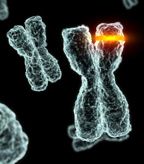PIK3CA Mutations Negatively Affect Survival in Trastuzumab-Treated HER2-Positive Breast Cancer
A study confirmed that PIK3CA mutations negatively affect survival in patients with HER2-positive breast cancer treated with the anti-HER2 therapy trastuzumab.
A small study has confirmed that PIK3CA mutations negatively affect outcomes of patients with HER2-positive breast cancer who are treated with the anti-HER2 therapy trastuzumab. The study, published in the British Journal of Cancer, calls for assessment of PIK3CA mutations in future clinical trials of anti-HER2 therapies, and in the clinical application of the therapies.

According to background information in the study, prior research has shown that activation of the PI3K pathway could negatively affect response to trastuzumab therapy. Specifically, both retrospective and prospective studies have indicated that survival is poor in patients with HER2-positive breast cancer and PIK3CA mutations treated with trastuzumab.
In this study, researchers, led by Ivan Bieche of the Institut Curie, Hpital Rene, France, examined if PIK3CA, which is mutated in 20% to 40% of breast cancers, influenced survival in 80 patients with HER2-positive breast cancer who had undergone neoadjuvant chemotherapy and 1 year of trastuzumab. Patients were given trastuzumab either neoadjuvantly (n = 43) or adjuvantly (n = 37).
Pretreatment tumor samples for these patients were obtained from the phase II randomized neoadjuvant REMAGUS 02 trial. Samples were screened for PIK3CA mutations using reverse transcription polymerase chain reaction amplification of exons 9 and 20 and their flanking exons.
Seventeen tumors (21.3%) screened positive for PIK3CA mutations, including four in exon 9 and thirteen in exon 20. Patients with PIK3CA mutations had significantly lower disease-free survival compared with patients with wild-type PIK3CA (HR = 4.26; 95% CI, 1.4–13).
When the researchers examined the results by subgroups of patients based on treatment arm significant differences were found.
“The most favorable survival was observed in the subgroup of patients without PIK3CA mutations treated in the neoadjuvant trastuzumab arm and the poorest prognosis was observed in the subgroup of patients with PIK3CA mutations treated in the adjuvant trastuzumab arm,” the researchers wrote.
“Altogether, these data suggest that only PIK3CA wild-type cancers clearly benefit from neoadjuvant trastuzumab therapy added to chemotherapy,” the researchers wrote. “On the other hand, the subgroup of patients bearing PIK3CA mutations could further benefit from treatment targeting PI3K pathway signaling.”